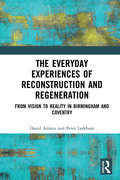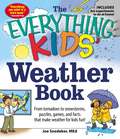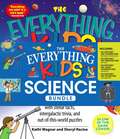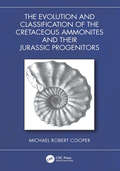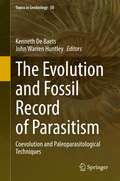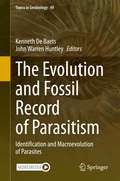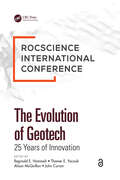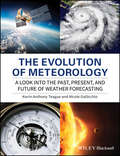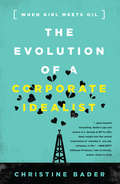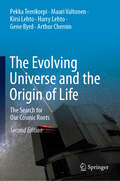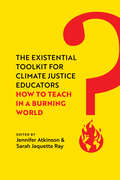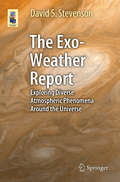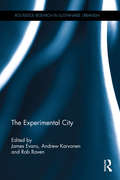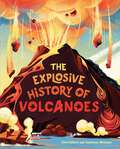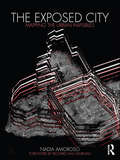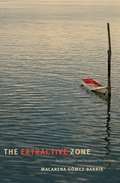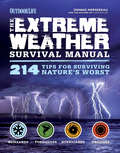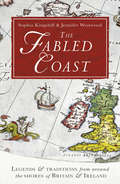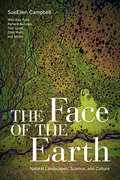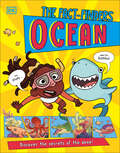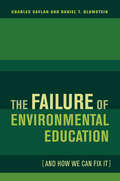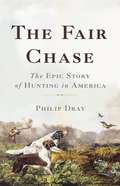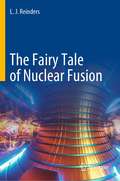- Table View
- List View
The Everglades, Florida Bay, and Coral Reefs of the Florida Keys: An Ecosystem Sourcebook
by James W. Porter Karen G. PorterProviding a synthesis of basic and applied research, The Everglades, Florida Bay, and Coral Reefs of the Florida Keys: An Ecosystem Sourcebook takes an encyclopedic look at how to study and manage ecosystems connected by surface and subsurface water movements. The book examines the South Florida hydroscape, a series of ecosystems linked by hydrolog
The Everyday Experiences of Reconstruction and Regeneration: From Vision to Reality in Birmingham and Coventry
by David Adams Peter LarkhamSet within a wider British and international context of post-war reconstruction, The Everyday Experiences of Reconstruction and Regeneration focuses on such debates and experiences in Birmingham and Coventry as they recovered from Second World War bombings and post-war industrial collapse. Including numerous images, Adams and Larkham explore the initial development of the post-Second World War reconstruction projects, which so substantially changed the face of the cities and provided radical new identities. Exploring these cities throughout the post-war period brings into sharp focus the duality of contemporary approaches to regeneration, which often criticise mid-twentieth century ’poorly-conceived’ planning and architectural projects for producing inhuman and unsympathetic schemes, while proposing exactly the type of large-scale regeneration that may potentially create similar issues in the future. This book would be beneficial for academics and students of planning and urban design, particularly those with an interest in post-catastrophe or large-scale reconstruction projects within cities.
The Everything KIDS' Weather Book: From Tornadoes to Snowstorms, Puzzles, Games, and Facts That Make Weather for Kids Fun! (Everything Kids)
by Joseph Snedeker<p>Get ready for a 100% chance of scientific fun! <p>Have you ever wondered what happens in the eye of a tornado or how hurricanes gain their strength? From lightning and snow-day blizzards to rainbows and monsoons, The Everything Kids' Weather Book gives you an exciting look into all the action that happens in the sky, including: The difference between cirrus and stratocumulus clouds; How meteorologists predict the weather; What the term "a perfect storm" means; How to build a weather station of your own; Why storms depend on how cold and warm fronts interact; How to create weather experiments at home; The effects of global warming on our planet. <p>Filled with hundreds of exciting facts and thirty fun weather puzzles and games, The Everything Kids' Weather Book is perfect for finding out how a barometer works, which cloud is a nimbus cloud, what causes hailstorms - and everything in between!
The Everything Kids' Science Bundle: The Everything® Kids' Astronomy Book; The Everything® Kids' Human Body Book; The Everything® Kids' Science Experiments Book; The Everything® Kids' Weather Book (Everything® Kids)
by Tom Robinson Kathi Wagner Sheryl Racine Sheri Amsel Joseph SnedekerWith The Everything® Kids’ Science Collection learning has never been so easy—or fun!Inside, you’ll find: The Everything® Kids’ Astronomy Book The Everything® Kids’ Human Body Book The Everything® Kids’ Science Experiments Book The Everything® Kids’ Weather Book You’ll have so much fun conducting experiments and completing activities, you’ll forget that you’re actually learning about science!
The Evolution and Classification of the Cretaceous Ammonites and their Jurassic Progenitors
by Michael Robert CooperThis book is a unique text that illustrates and describes all the nominal genera of Cretaceous ammonites and their Jurassic progenitors on the basis of their type species.There is no judgement as to validity, and the authors leaves it to the reader to subjectively recognize or synonymize those taxa as they see fit, based on the premises and philosophies to which they ascribe. The author argues that the taxonomy offered by the Treatise, the fundamental reference work, is no longer appropriate and genera need to be redefined according to testable hypotheses. The purpose of this book, therefore, is redescribe the type species of every nominal genus and to use these to construct a new phylogenetic classification not hampered by preconceived opinion. It emphasizes the importance of "trifling characters" for classification, and that taxonomic rank is not optional but is predetermined by evolutionary position. A new higher classification is introduced for the group using the higher taxa proposed for the phylogenetic classification of the Bivalvia. Hypothesized relationships are depicted by the use of cladograms, recognizing these portray only affiliations among the sample and not necessarily close taxonomic bond.This book will be of great interest to palaeontologists, geologists, stratigraphers, biogeographers and interested students of geology, and paleology. It will also make a good addition to universities, museums, and public libraries.
The Evolution and Fossil Record of Parasitism: Coevolution and Paleoparasitological Techniques (Topics in Geobiology #50)
by Kenneth De Baets John Warren HuntleyThis two-volume edited book highlights and reviews the potential of the fossil record to calibrate the origin and evolution of parasitism, and the techniques to understand the development of parasite-host associations and their relationships with environmental and ecological changes. The book deploys a broad and comprehensive approach, aimed at understanding the origins and developments of various parasite groups, in order to provide a wider evolutionary picture of parasitism as part of biodiversity. This is in contrast to most contributions by parasitologists in the literature that focus on circular lines of evidence, such as extrapolating from current host associations or distributions, to estimate constraints on the timing of the origin and evolution of various parasite groups. This approach is narrow and fails to provide the wider evolutionary picture of parasitism on, and as part of, biodiversity.Volume two focuses on the importance of direct host associations and host responses such as pathologies in the geological record to constrain the role of antagonistic interactions in driving the diversification and extinction of parasite-host relationships and disease. To better understand the impact on host populations, emphasis is given to arthropods, colonial metazoans, echinoderms, mollusks and vertebrates as hosts. In addition, novel techniques used to constrain interactions in deep time are discussed ranging from chemical and microscopic investigations of host remains, such as blood and coprolites, to the statistical inference of lateral transfer of transposons and host-parasite coevolutionary dynamics using molecular divergence time estimation.
The Evolution and Fossil Record of Parasitism: Identification and Macroevolution of Parasites (Topics in Geobiology #49)
by Kenneth De Baets John Warren HuntleyThis two-volume edited book highlights and reviews the potential of the fossil record to calibrate the origin and evolution of parasitism, and the techniques to understand the development of parasite-host associations and their relationships with environmental and ecological changes. The book deploys a broad and comprehensive approach, aimed at understanding the origins and developments of various parasite groups, in order to provide a wider evolutionary picture of parasitism as part of biodiversity. This is in contrast to most contributions by parasitologists in the literature that focus on circular lines of evidence, such as extrapolating from current host associations or distributions, to estimate constraints on the timing of the origin and evolution of various parasite groups. This approach is narrow and fails to provide the wider evolutionary picture of parasitism on, and as part of, biodiversity. Volume one focuses on identifying parasitism in the fossil record, and sheds light on the distribution and ecological importance of parasite-host interactions over time. In order to better understand the evolutionary history of parasites and their relationship with changes in the environment, emphasis is given to viruses, bacteria, protists and multicellular eukaryotes as parasites. Particular attention is given to fungi and metazoans such as bivalves, cnidarians, crustaceans, gastropods, helminths, insects, mites and ticks as parasites. Researchers, specifically evolutionary (paleo)biologists and parasitologists, interested in the evolutionary history of parasite-host interactions as well as students studying parasitism will find this book appealing.
The Evolution of Geotech - 25 Years of Innovation
by Reginald E. HammahThis publication includes 82 technical papers presented at Rocscience International Conference (RIC) 2021, held online on April 20 and 21, 2021. Rocscience created this event to bring geotechnical academics, researchers and practitioners together to exchange ideas as part of celebrating 25 years of the company’s existence. The papers in these proceedings were from keynotes, panel discussions and papers, selected after careful review of over 100 technical submissions delivered at RIC 2021. The technical papers were grouped into sessions based on their subject areas. The conference aimed to stimulate discussions that could help the industry work towards overcoming geotechnical engineering limitations today. It also sought to foster creative thinking that will advance the current states of the art and practice. The keynote addresses, panel discussions and technical presentations tried to examine geotechnical problems and situations from fresh perspectives. RIC 2021 hopes that the proceedings will continue to enrich our thinking and contribute to achieving a critical mass of change in our practices and approaches. We look forward to significant improvements in our industry.
The Evolution of Meteorology: A Look into the Past, Present, and Future of Weather Forecasting (Advances In Environmental Science Ser.)
by Kevin Anthony Teague Nicole GallicchioThe essential guide to the history, current trends, and the future of meteorology This comprehensive review explores the evolution of the field of meteorology, from its infancy in 3000 bc, through the birth of fresh ideas and the naming of the field as a science, to the technology boom, to today. The Evolution of Meteorology reveals the full story of where meteorology was then to where it is now, where the field is heading, and what needs to be done to get the field to levels never before imagined. Authored by experts of the topic, this book includes information on forecasting technologies, organizations, governmental agencies, and world cooperative projects. The authors explore the ancient history of the first attempts to understand and predict weather and examine the influence of the very early birth of television, computers, and technologies that are useful to meteorology. This modern-day examination of meteorology is filled with compelling research, statistics, future paths, ideas, and suggestions. This vital resource: Examines current information on climate change and recent extreme weather events Starts with the Ancient Babylonians and ends with the largest global agreement of any kind with the Paris Agreement Includes current information on the most authoritative research in the field of meteorology Contains data on climate change theories and understanding, as well as extreme weather statistics and histories This enlightening text explores in full the history of the study of meteorology in order to bring awareness to the overall path and future prospects of meteorology.
The Evolution of a Corporate Idealist: When Girl Meets Oil
by Christine BaderThere is an invisible army of people deep inside the world's biggest and best-known companies, pushing for safer and more responsible practices. They are trying to prevent the next Rana Plaza factory collapse, the next Deepwater Horizon explosion, the next Foxconn labor abuses. Obviously, they don't always succeed.Christine Bader was one of those people. She loved BP and then-CEO John Browne's lofty rhetoric on climate change and human rights--until a string of fatal BP accidents, Browne's abrupt resignation under a cloud of scandal, and the start of Tony Hayward's tenure as chief executive, which would end with the Deepwater Horizon disaster. Bader's story of working deep inside the belly of the beast is unique in its details, but not in its themes: of feeling like an outsider both inside the company (accused of being a closet activist) and out (assumed to be a corporate shill); of getting mixed messages from senior management; of being frustrated with corporate life but committed to pushing for change from within.The Evolution of a Corporate Idealist: Girl Meets Oil is based on Bader's experience with BP and then with a United Nations effort to prevent and address human rights abuses linked to business. Using her story as its skeleton, Bader weaves in the stories of other "Corporate Idealists" working inside some of the world's biggest and best-known companies.
The Evolving Universe and the Origin of Life: The Search for Our Cosmic Roots (Lecture Notes In Mathematics #Vol. 736)
by Pekka Teerikorpi Mauri Valtonen Kirsi Lehto Harry Lehto Gene Byrd Arthur CherninRegarding his discoveries, Sir Isaac Newton famously said, "If I have seen further it is by standing upon the shoulders of giants." The Evolving Universe and the Origin of Life describes, complete with fascinating biographical details of the thinkers involved, a history of the universe as interpreted by the expanding body of knowledge of humankind. From subatomic particles to the protein chains that form life, and expanding in scale to the entire universe, this book covers the science that explains how we came to be. This book contains a great breadth of knowledge, from astronomy and physics to chemistry and biology. The second edition brings this story up to date, chronicling scientific achievements in recent years in such fields of research as cosmology, the large-scale architecture of the universe, black holes, exoplanets, and the search for extraterrestrial life. With over 250 figures, this is a non-technical, easy-to-read textbook at an introductory college level that is ideal for anyone interested in science as well as its history.
The Existential Toolkit for Climate Justice Educators: How to Teach in a Burning World
by Sarah Jaquette Ray Jennifer AtkinsonAn easy-to-use field guide for teaching on climate injustice and building resilience in your students—and yourself—in an age of crisis. As feelings of eco-grief and climate anxiety grow, educators are grappling with how to help students learn about the violent systems causing climate change while simultaneously navigating the emotions this knowledge elicits. This book provides resources for developing emotional and existential tenacity in college classrooms so that students can stay engaged. Featuring insights from scholars, educators, activists, artists, game designers, and others who are integrating emotional wisdom into climate justice education, this user-friendly guide offers a robust menu of interdisciplinary, plug-and-play teaching strategies, lesson plans, and activities to support student transformation and build resilience. The book also includes reflections from students who have taken classes that incorporate their emotions in the curricula. Galvanizing and practical, The Existential Toolkit for Climate Justice Educators will equip both educators and their students with tools for advancing climate justice.
The Exo-Weather Report
by David S. StevensonDavid Stevenson's new book links the meteorology of the Earth to that of other planets, stars, and clusters of galaxies, showing the similarities and differences between terrestrial weather and that of weather on other worlds. Because Earth is not unique in having weather, there is much to learn from other planets with atmospheres that show the movement of energy from hotter to colder areas. The weather seen on Earth and other known planetary systems are examined to elaborate the connection between climate and the development of life. The weather on Earth and other Solar System planets is a manifestation of the huge energy budget imparted by our star, the Sun, but weather doesn't stop at the shores of our Solar System. The author brings together the latest information from satellites and probes, such as Cassini and Hubble, to show its larger place in the astronomical picture. Inferences are drawn about the weather and climate of a large number of other planetary systems that lie far from our own. Additionally, the author expands our understanding of what exactly weather is comprised of by exploring the kind of "weather" experienced on the largest observable scales in the universe.
The Experimental City (Routledge Research in Sustainable Urbanism)
by James Evans, Andrew Karvonen and Rob RavenThis book explores how the concept or urban experimentation is being used to reshape practices of knowledge production in urban debates about resilience, climate change governance, and socio-technical transitions. With contributions from leading scholars, and case studies from the Global North and South, from small to large scale cities, this book suggests that urban experiments offer novel modes of engagement, governance, and politics that both challenge and complement conventional strategies. The book is organized around three cross-cutting themes. Part I explores the logics of urban experimentation, different approaches, and how and why they are deployed. Part II considers how experiments are being staged within cities, by whom, and with what effects? Part III examines how entire cities or groups of cities are constructed as experiments. This book seeks to contribute a deeper and more socially and politically nuanced understanding of how urban experiments shape cities and drive wider changes in society, providing a framework to examine the phenomenon of urban experimentation in conceptual and empirical detail.
The Explosive History of Volcanoes
by Clive GiffordSpewing out fountains of red-hot lava and toxic plumes of smoke, volcanoes are dangerous and deadly. But every volcano is different - in shape and size, location and destructiveness.The Explosive History of Volcanoes explains the Volcanic Explosivity Index giving examples of more than 25 of the most, and least, explosive volcanoes in history and in the world today.Find out about these amazing natural phenomena and see how they're formed, where they are in the world and why some explode so violently. Discover why people live so close to volcanoes and how scientists are helping to predict when the next eruptions might occur.The consultant, Professor Katharine Cashman, is Professor of Volcanology, currently working at the University of Oregon.
The Exposed City: Mapping the Urban Invisibles
by Nadia AmorosoThere is a vast amount of information about a city which is invisible to the human eye – crime levels, transportation patterns, cell phone use and air quality to name just a few. If a city was able to be defined by these characteristics, what form would it take? How could it be mapped? Nadia Amoroso tackles these questions by taking statistical urban data and exploring how they could be transformed into innovative new maps. The "unseen" elements of the city are examined in groundbreaking images throughout the book, which are complemented by interviews with Winy Maas and James Corner, comments by Richard Saul Wurman, and sections by the SENSEable City Lab group and Mark Aubin, co-founder of Google Earth.
The Extractive Zone: Social Ecologies and Decolonial Perspectives
by Macarena Gómez-BarrisIn The Extractive Zone Macarena Gómez-Barris traces the political, aesthetic, and performative practices that emerge in opposition to the ruinous effects of extractive capital. The work of Indigenous activists, intellectuals, and artists in spaces Gómez-Barris labels extractive zones—majority indigenous regions in South America noted for their biodiversity and long history of exploitative natural resource extraction—resist and refuse the terms of racial capital and the continued legacies of colonialism. Extending decolonial theory with race, sexuality, and critical Indigenous studies, Gómez-Barris develops new vocabularies for alternative forms of social and political life. She shows how from Colombia to southern Chile artists like filmmaker Huichaqueo Perez and visual artist Carolina Caycedo formulate decolonial aesthetics. She also examines the decolonizing politics of a Bolivian anarcho-feminist collective and a coalition in eastern Ecuador that protects the region from oil drilling. In so doing, Gómez-Barris reveals the continued presence of colonial logics and locates emergent modes of living beyond the boundaries of destructive extractive capital.
The Extreme Weather Survival Manual: 214 Tips for Surviving Nature's Worst (Outdoor Life)
by The Editors of Outdoor Life Dennis MersereauFast facts and practical advice to keep you prepared, whether you&’re dealing with mud or flood, drought or derecho. This valuable, comprehensive guide is full of life-saving information for virtually any extreme weather event—blizzard, hurricane, firestorm, tornado, heatwave, and beyond. Weather reporter Dennis Mersereau, working with the editors of Outdoor Life magazine, debunks common myths, provides hands-on survival tips (some of them literally hands-on—as in, don&’t lose your fingers to frostbite), and shares some fascinating historical facts and world records. Learn how to: Read a weather mapSurvive in a snowbound carStay oriented in a whiteoutMake waterproof matchesAvoid lightning hot spotsRescue someone caught in a floodKnow your monsoonsSurvive a sandstormMake peace with the polar vortexDrought-proof your home and much more &“Don&’t mess with the Mersereau. He will find your weather fables and he will crush them…We need more Dennises. In fact, the National Weather Service itself should be run by Dennis, with each local office headed by a Dennis-like weather blogger tasked with explaining the relevant weather news of the day, and entertaining us when the weather is boring.&”—Slate
The Fabled Coast: Legends & traditions from around the shores of Britain & Ireland
by Sophia Kingshill Jennifer Beatrice WestwoodPirates and smugglers, ghost ships and sea-serpents, fishermen’s prayers and sailors’ rituals – the coastline of the British Isles plays host to an astonishingly rich variety of local legends, customs, and superstitions.In The Fabled Coast, renowned folklorists Sophia Kingshill and Jennifer Westwood gather together the most enthralling tales and traditions, tracing their origins and examining the facts behind the legends. Was there ever such a beast as the monstrous Kraken? Did a Welsh prince discover America, centuries before Columbus? What happened to the missing crew of the Mary Celeste? Along the way, they recount the stories that are an integral part of our coastal heritage, such as the tale of Drake’s Drum, said to be heard when England was in peril, and the mythical island of Hy Brazil, which for centuries appeared on sea charts and maps to the west of Ireland. The result is an endlessly fascinating, often surprising journey through our island history.
The Face of the Earth: Natural Landscapes, Science, and Culture
by Sue Ellen CampbellThis lively book sweeps across dramatic and varied terrains--volcanoes and glaciers, billabongs and canyons, prairies and rain forests--to explore how humans have made sense of our planet's marvelous landscapes. In a rich weave of scientific, cultural, and personal stories, The Face of the Earth examines mirages and satellite images, swamp-dwelling heroes and Tibetan nomads, cave paintings and popular movies, investigating how we live with the great shaping forces of nature--from fire to changing climates and the intricacies of adaptation. The book illuminates subjects as diverse as the literary life of hollow Earth theories, the links between the Little Ice Age and Frankenstein's monster, and the spiritual allure of deserts and their scarce waters. Including vivid, on-the-spot accounts by scientists and writers in Saudi Arabia, Australia, Alaska, England, the Rocky Mountains, Antarctica, and elsewhere, The Face of the Earth charts the depth and complexity of our interdependence with the natural world.
The Fact-Finders Ocean: Discover the Secrets of the Deep! (The Fact-Finders)
by DKExplore the wonderful world beneath the waves in this fun, non-fiction graphic novel packed with fun facts and engaging characters.Learn about waves, tides, and currents, which keep our oceans moving continuously in this comic book for children aged 6-8. Filled with bite-sized information, colorful illustrations, and a fun story, this graphic novel will engage every budding marine enthusiast and nature explorer. With the help of the Fact-Finders, children will stock up on their knowledge as well as understand the importance of the ocean and how crucial it is to protect it.This educational graphic novel for kids offers: Age-appropriate vocabulary that explains a wide range of both familiar and unfamiliar topics and terms.Fun and engaging characters and facts provided in in a conversational style for an immersive learning experience.Content by award-winning author Tracey Turner which has been checked by experts to ensure all information is credible. Put on your wetsuit, jump into the ocean, and swim along to explore with your guides, Shelly and Bubbles. Learn all about the world's oceans, underwater habitats, and the fascinating lives of countless creatures that live there. What lurks in the ocean's darkest depths? Where can you find gummy squirrels and yeti crabs? Why are cookie cutters and chocolate chips part of marine life? Find out all this and much more in this guide to our underwater world!More in the seriesFact-Finders is a fun, nonfiction graphic novel series that teaches kids all about a variety of topics on the world around them. If you enjoyed Fact-Finders Ocean, why not try Fact-Finders Universe to discover our vast solar system and beyond?
The Factory Girls: A Kaleidoscopic Account of the Triangle Shirtwaist Factory Fire
by Christine SeifertThe twentieth century ushered in a new world filled with a dazzling array of consumer goods. Even the poorest immigrant girls could afford a blouse or two. But these same immigrant teens toiled away in factories in appalling working conditions. Their hard work and sacrifice lined the pockets of greedy factory owners who were almost exclusively white men. The tragic Triangle Waist Factory fire in 1911 resulted in the deaths of over a hundred young people, mostly immigrant girls, who were locked in the factory. Told from the perspective of six young women who lived the story, this book reminds us why what we buy and how we vote really matter.
The Failure of Environmental Education (And How We Can Fix It)
by Charles Saylan Daniel T. BlumsteinAt a time when wild places everywhere are vanishing before our eyes, Charles Saylan and Daniel T. Blumstein offer this passionate indictment of environmental education--along with a new vision for the future. Writing for general readers and educators alike, Saylan and Blumstein boldly argue that education today has failed to reach its potential in fighting climate change, biodiversity loss, and environmental degradation. In this forward-looking book, they assess the current political climate, including the No Child Left Behind Act, a disaster for environmental education, and discuss how education can stimulate action--including decreasing consumption and demand, developing sustainable food and energy sources, and addressing poverty. Their multidisciplinary perspective encompasses such approaches as school gardens, using school buildings as teaching tools, and the greening of schoolyards. Arguing for a paradigm shift in the way we view education as a whole, The Failure of Environmental Education demonstrates how our education system can create new levels of awareness and work toward a sustainable future.
The Fair Chase: The Epic Story of Hunting in America
by Philip DrayAn award-winning historian tells the story of hunting in America, showing how this sport has shaped our national identity.From Daniel Boone to Teddy Roosevelt, hunting is one of America's most sacred-but also most fraught-traditions. It was promoted in the 19th century as a way to reconnect "soft" urban Americans with nature and to the legacy of the country's pathfinding heroes. Fair chase, a hunting code of ethics emphasizing fairness, rugged independence, and restraint towards wildlife, emerged as a worldview and gave birth to the conservation movement. But the sport's popularity also caused class, ethnic, and racial divisions, and stirred debate about the treatment of Native Americans and the role of hunting in preparing young men for war. This sweeping and balanced book offers a definitive account of hunting in America. It is essential reading for anyone interested in the evolution of our nation's foundational myths.
The Fairy Tale of Nuclear Fusion
by L. J. ReindersThis carefully researched book presents facts and arguments showing, beyond a doubt, that nuclear fusion power will not be technically feasible in time to satisfy the world's urgent need for climate-neutral energy.The author describes the 70-year history of nuclear fusion; the vain attempts to construct an energy-generating nuclear fusion power reactor, and shows that even in the most optimistic scenario nuclear fusion, in spite of the claims of its proponents, will not be able to make a sizable contribution to the energy mix in this century, whatever the outcome of ITER. This implies that fusion power will not be a factor in combating climate change, and that the race to save the climate with carbon-free energy will have been won or lost long before the first nuclear fusion power station comes on line.Aimed at the general public as well as those whose decisions directly affect energy policy, this book will be a valuable resource for informing future debates.

